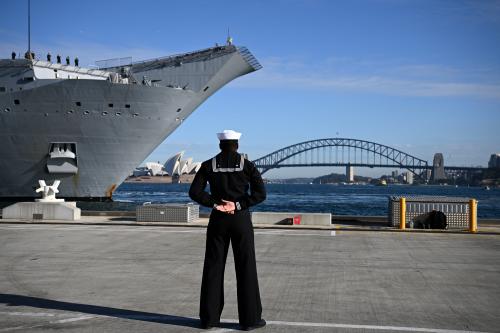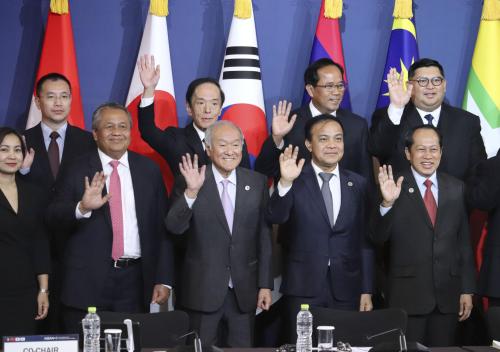In March last year, Kevin Rudd announced Australia would be a candidate for a non-permanent seat on the UN Security Council in 2013-14. New Lowy Institute polling released today reveals this campaign is very popular: nearly three-quarters (71 per cent) of Australians agree that we should seek a seat, while only 6 per cent disagree.
It clearly would be in Australia’s national interest for us to win a seat on the council.
Membership of the council would increase Australia’s international leverage. It would add to our reputation as a country with global interests and capacities. Like our alliance with the US, it would be a source of prestige, but a different and complementary source of prestige.
The Security Council is the world’s pre-eminent crisis management forum. It represents the pointy end of the UN because of its powers to respond to threats to international security. Crises as diverse as the Australian-led intervention in East Timor in 1999 and the invasion of Iraq in 2003 illustrate the council’s centrality in conferring international legitimacy on the use of force, or denying it, which in turn affects the risks and costs of a military operation.
Issues on the council agenda in 2013-14 may include the Afghanistan war, terrorism and the Iranian and North Korean nuclear programs. For nearly a quarter-century, Australia has had to rely on others to represent our views on these kinds of questions. It is past time that we sat at the big table and made our own arguments.
The 6 per cent of Australians who oppose the bid are, however, very vocal. The reaction on the opinion pages of newspapers has been overwhelmingly negative. However, none of the three main arguments that have been put forward against Australia’s campaign is convincing.
The first objection is that the process of campaigning is forcing Australia to compromise its foreign policy values. Government decisions have been characterised, without much evidence, as attempts to curry favour with UN member states.
Most of these specific claims are unconvincing. At a more general level, though, it is pointless to deny that candidates for election will adjust their behaviour from time to time and make some compromises. Compromise is inherent to realpolitik.
The critics imply that, without the bid, Australia could get back to running a pure foreign policy. Yet, as Gough Whitlam noted, only the impotent are pure. Both Labor and Liberal prime ministers have found that foreign policy success requires a pragmatic approach.
The Australian government no doubt will take steps to maximise its electoral support. If not, why enter the race at all? It will practise all the dark arts of politics.
But Australia will not compromise its values because the whole point of this exercise is to promote our values as well as our interests.
In any case, a race to the ethical bottom is rarely a winning Security Council campaign strategy. It is usually more valuable to be seen as a reliable and consistent player.
The second criticism of the bid is that it is too expensive. The government estimates it will spend $13million during the first three years of the bid. Sceptics have provided estimates ranging from $35m to $1.5billion.
Some of these estimates are plainly ridiculous. But the real problem is not so much the fuzzy maths as the strange sense of priorities revealed by all this pettifoggery.
Yes, the government needs to be prudent in its expenditure of public money. But how expensive is this campaign compared with other exercises in international policy? A $35m campaign, if that is indeed the true cost, would be equivalent in value to one-half of one of the Australian Defence Force’s 46 new MRH-90 helicopters, or one-fifth of one of the RAAF’s 24 new Super Hornet aircraft. I am all in favour of a muscular ADF. But would two years on the Security Council, if our campaign were successful, not be worth one-half a helicopter or one-fifth of a plane?
The critics’ focus on relatively insignificant costs reveals a depressingly small opinion of Australia’s possibilities. Do they really take such a straitened view of our role in the world that they would cavil at the cost of running a diplomatic campaign? It is hard not to be reminded of Alexander Downer’s Playford Lecture in 2007, in which he accused his opponents of running a “little Australia” campaign and ignoring Australia’s “responsibilities as a significant global citizen”, and urged them to think big.
The final criticism, made from the Right and the Left, is that membership of the Security Council would put us in the awkward situation of having to state our position on controversial issues. These critics would prefer, apparently, a small-target strategy whereby Australia avoided difficult questions and refused to speak its mind on global issues. But that is not the kind of foreign policy Australia has traditionally adopted. In fact, one could go so far as to say it would be a distortion of our values.
Our interests are better served by having clear and well-understood positions on global issues rather than by dissembling on everything outside our immediate sphere of interest.
The arguments of the sceptics are not only weak, they are inconsistent. Supposedly we should refrain from compromising our foreign policy values but also refrain from stating our opinion on contentious issues; elected membership of the council is apparently dangerous (because it would expose us to conflict with big powers) and irrelevant (because it would group us with minor powers).
In fact, the best argument for ending our candidacy would be if we had a negligible chance of winning. But while we have a reasonable chance, we should press on at speed. A quarter-century is long enough for Australia to be away from the Security Council chamber. This bid is not only well supported, it is also well advised.


Commentary
Op-edRudd Right to Press for UN Seat
September 23, 2009